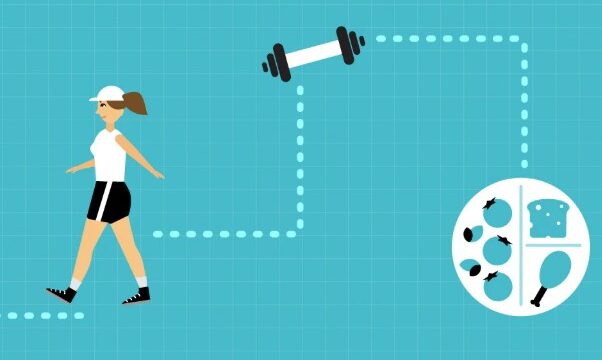Building a healthy lifestyle starts with small, consistent goals that gradually turn into lasting habits.
Many people set big fitness targets with excitement, but the real success comes from transforming those goals into daily actions that feel achievable and rewarding.
When healthy goals are designed with care and balance, they naturally turn into small wins that add up over time, helping you feel more confident, energized, and connected to your body.
The first step to creating healthy goals that lead to daily wins is focusing on simplicity. Big changes can seem inspiring, but they are often harder to maintain. Instead of trying to do everything at once, choose small goals that fit your current lifestyle. For example, deciding to move for ten minutes a day, stretch after waking up, or take the stairs more often may seem minor, but these choices build momentum. Consistency with small steps creates stronger habits than inconsistent effort with large ones. Healthy goals also work best when they feel personal. Everyone’s body, schedule, and motivation are different, so your goals should reflect your unique rhythm. Some people feel most active in the morning, while others prefer moving later in the day. Some enjoy calm activities like yoga or walking, while others find joy in dance or strength training. Choosing what feels right for you makes it easier to stick with your plan. When your fitness goals match your personality and preferences, they turn into actions you look forward to. Another key element of turning goals into daily wins is understanding progress as a journey, not a race. It is common to expect fast results, but lasting fitness comes from steady improvement. Shifting your focus from quick transformations to consistent effort helps you enjoy the process. Each day you follow through, no matter how small the step, you are building strength and discipline. This mindset transforms routine actions into small victories that remind you of your growth. It helps to set goals that are specific and measurable without being strict. Instead of saying, “I’ll exercise more,” you might decide, “I’ll walk for fifteen minutes after lunch” or “I’ll do gentle stretches three evenings this week.” These kinds of goals give your efforts structure while still allowing flexibility. When you meet them, you feel a genuine sense of accomplishment. Small, measurable actions lead to visible progress that encourages you to continue. Healthy fitness goals also include balance between effort and rest. Pushing too hard without giving your body time to recover can lead to burnout or discomfort. Building rest days or light recovery activities, such as stretching or deep breathing, helps maintain energy and enthusiasm. This balance allows your body to adapt, rebuild, and grow stronger over time. Recognizing that rest is part of progress makes your approach to fitness more sustainable and enjoyable. Another way to transform healthy goals into daily wins is to link them to your routine. When fitness becomes part of your normal day, it stops feeling like an extra task. You might stretch while watching television, do squats while brushing your teeth, or walk during phone calls. By connecting new habits to existing ones, your routine becomes more active without requiring major lifestyle changes. The easier it feels, the more likely you are to stay consistent. Mindset plays a huge role in turning small goals into meaningful victories. Viewing fitness as an act of self-care rather than a chore creates a more positive experience. When you exercise out of appreciation for your body instead of frustration with it, motivation grows naturally. Each time you complete a workout or stay active, you reinforce a message of self-respect. That sense of pride is a powerful daily win. Celebrating small achievements is another important part of this process. Many people overlook everyday progress while waiting for big milestones, but the little things matter most. Finishing a short workout, drinking enough water, or simply showing up for yourself are all reasons to celebrate. These moments build confidence and remind you that improvement is happening. Recognition keeps motivation alive and turns consistency into something rewarding. Healthy goals should also evolve with your progress. As you grow stronger and more confident, you may want to adjust your targets to match your new level. For instance, if ten minutes of walking feels easy, you might increase it to fifteen. If light stretches no longer challenge you, you can explore new routines. Regularly updating your goals keeps your journey exciting and ensures continued improvement. Growth feels more satisfying when it happens gradually and naturally. Listening to your body is essential in making your goals sustainable. Some days you may have more energy, and other days you may need to slow down. Paying attention to how you feel prevents overexertion and helps you avoid frustration. Flexibility in your plan allows you to adapt without losing momentum. When you honor your body’s signals, your fitness journey becomes more supportive and less stressful. Encouragement also comes from finding joy in movement. Fitness does not have to be limited to traditional workouts. Dancing, gardening, playing with your pets, or doing household chores with enthusiasm all count as active movement. When you enjoy what you are doing, it no longer feels like work. Finding fun ways to stay active ensures that your goals feel fresh and motivating. Environment can make a big difference in how easy it is to stick to your goals. Keeping your space organized, setting up a small workout corner, or preparing your gear in advance can help you stay ready. Visual cues, like leaving a yoga mat out or placing a water bottle on your desk, gently remind you to stay active. Creating an environment that supports movement turns your surroundings into a silent motivator. Social support adds another layer of encouragement. Sharing your goals with a friend, family member, or online community helps you stay accountable and inspired. You can exchange progress updates, celebrate each other’s achievements, and provide motivation on days when energy feels low. Working toward similar goals together makes the process more enjoyable and less isolating. Consistency comes from building habits that blend smoothly into daily life. Instead of waiting for perfect conditions or motivation, practice showing up regularly in small ways. Even brief activity, done consistently, strengthens both body and mind. Over time, you will notice how movement becomes second nature—a normal part of your day that brings satisfaction and pride. Gratitude can also deepen your connection to fitness. Taking a few moments after each session to appreciate your effort can change the way you view your progress. Whether you are thankful for the strength to move, the time you dedicated, or the calmness that follows exercise, gratitude turns each goal into a meaningful achievement. It reminds you that health is a journey worth appreciating every day. It is also helpful to stay patient. Results may not always appear quickly, but consistency builds a strong foundation. Trusting the process allows you to stay focused without frustration. Every small effort compounds over time, leading to significant change. Recognizing this truth helps you approach fitness with peace and confidence. Ultimately, healthy goals that turn into daily fitness wins are rooted in kindness and sustainability. They honor your current abilities while allowing space for growth. Each step you take—whether it is stretching, walking, or mindful breathing—counts as progress. When your goals are realistic, personal, and enjoyable, they encourage you to keep moving forward without stress or guilt. In time, those small daily efforts create lasting transformation. Fitness stops being something you do occasionally and becomes a part of who you are. The energy, strength, and balance you gain along the way are proof that progress is built one step at a time. By focusing on healthy goals that inspire daily wins, you build not just physical strength, but also confidence, happiness, and a lifelong appreciation for movement.






